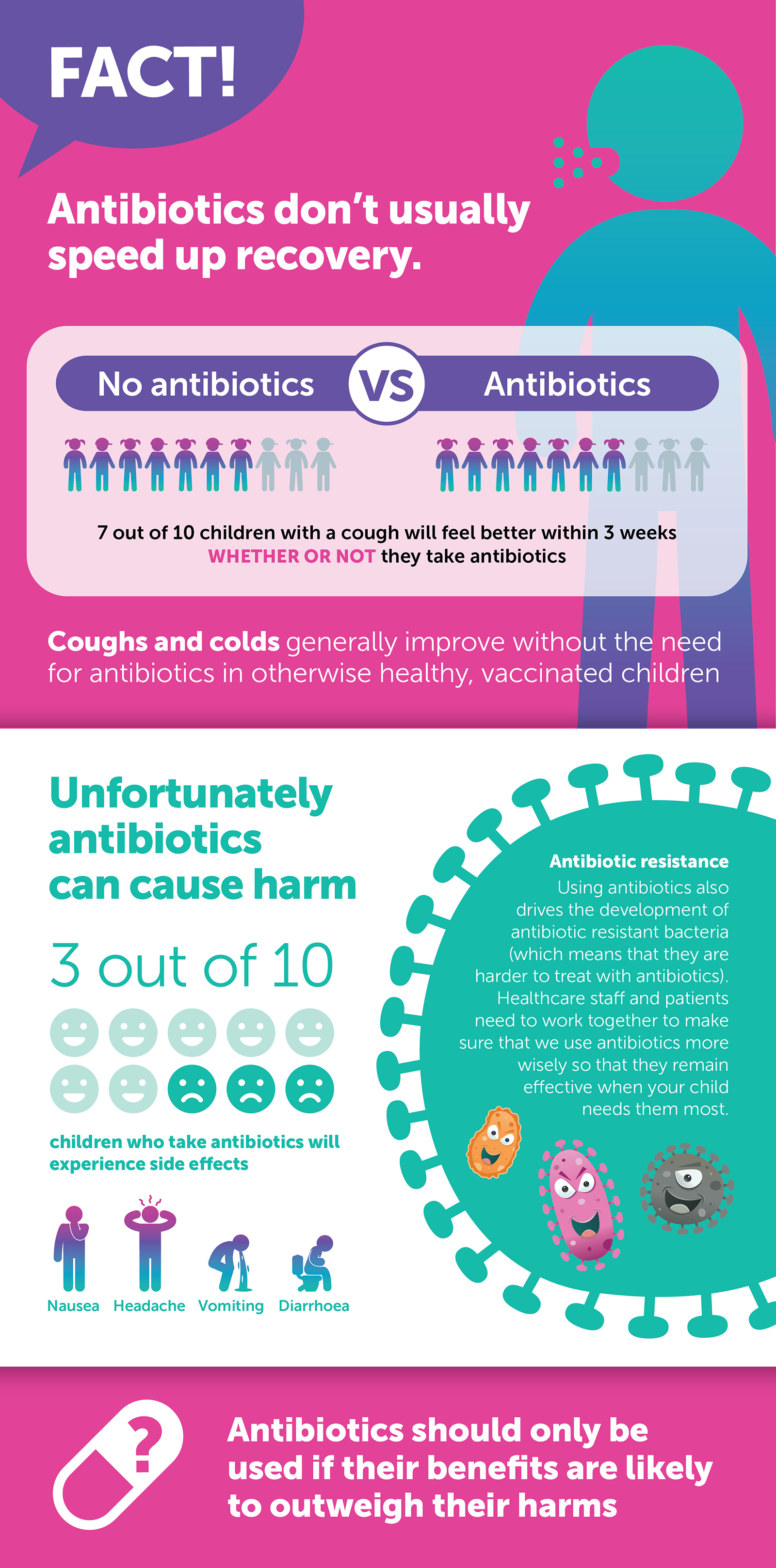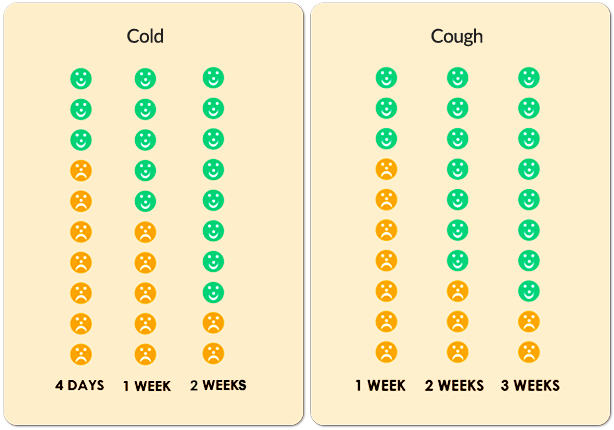Bronchiolitis and RSV
Bronchiolitis is an infection that causes the tiniest airways in your child’s lungs to become swollen. This can make it more difficult for your child to breathe:
- Bronchiolitis tends to affect young children (under 2 years of age) is caused by a number of different viral infections. One of the most common viruses that causes bronchiolitis is Respiratory Syncytial Virus (RSV).
- Rates of RSV usually peak in winter (November and December).
- Bronchiolitis usually only causes cold like symptoms and mild breathing difficulty - breathing may be faster than normal as well as noisy and they may not be able to take their usual amount of milk by breast or bottle. Your child may get a little worse each day until the 3rd or 4th day of their illness after which they are likely to start improving. However, most children get better on their own; there are no specific medical treatments that speed up recovery from bronchiolitis and many children will continue to cough for a few weeks afterwards.
Some children, especially those under 6 weeks of age or young children with heart or lung problems, can develop significant breathing difficulty and may need to go to hospital for help supporting their breathing and feeding.
Bronchiolitis Video
When should you worry?
If your child has any of the following:
- Is pale, mottled and feels abnormally cold to touch
- Has pauses in their breathing lasting more than 10 seconds, makes a grunting noise every time they breathe out or has blue lips
- Is stiff or rigid or makes repeated, jerky movements of arms or legs that doesn't stop when you hold them (a fit or seizure)
- Is extremely agitated (crying inconsolably despite distraction), confused or very lethargic (difficult to wake)
- Has a rash that does not disappear with pressure (the ‘Glass Test’)
- Is under 3 months of age with a temperature of 38°C / 100.4°F or above (unless fever in the 48 hours following vaccinations and no other red or amber features)
You need urgent help
Go to the nearest Hospital Emergency (A&E) Department or phone 999
If your child has any of the following:
- Has laboured/rapid breathing or they are working hard to breathe – drawing in of the muscles below their lower ribs, at their neck or between their ribs (recession)
- A harsh breath noise as they breathe in (stridor) present only when they are upset
- Seems dehydrated (sunken eyes, drowsy or not had a wee or wet nappy for eight hours)
- Is becoming drowsy (excessively sleepy) or irritable (unable to settle them with toys, TV, food or picking up) – especially if they remain drowsy or irritable despite their fever coming down
- Has extreme shivering or complains of muscle pain
- Is 3-6 months of age with a temperature of 39°C / 102.2°F or above (but fever is common in babies up to 2 days after they receive vaccinations)
- Continues to have a fever of 38.0°C or above for more than 5 days
- Is getting worse or if you are worried
You need to contact a doctor or nurse today
Please ring your GP surgery or call NHS 111 - dial 111
We recognise that during the current COVID-19 crisis, at peak times, access to a health care professional may be delayed. If symptoms persist for 4 hours or more and you have not been able to speak to either a member of staff from your GP practice or to NHS 111 staff, then consider taking them to your nearest Emergency Department
If none of the above features are present
- None of the above features are present
- Additional advice is also available to young families for coping with crying of well babies – click here
Self care
Continue providing your child’s care at home. If you are still concerned about your child, call NHS 111 – dial 111
This content has been developed by healthcare professionals from across the UK in collaboration with the RCPCH.
What should you do?
- Keep your child well hydrated by offering them lots of fluids
- Most children with coughs/colds do not require treatment with antibiotics. Antibiotics rarely speed up recovery and often cause side effects such as rash and diarrhoea. They will also promote the development of antibiotic resistant bacteria in your child
- Try children's paracetamol and/or ibuprofen - cough syrup does not tend to help with coughs
- Try using saline nose drops or spray if your baby has a blocked nose
- For children over 1 year, a spoon of honey (perhaps in a warm drink) half an hour before bed may help them to wake less often in the night
- For children over 2 years, vapour rubs (containing camphor, menthol and/or eucalyptus) may help children sleep better

How long will your child's symptoms last?
- Unfortunately, coughs and colds can continue for weeks before they get better. In addition, over the winter, children are likely to get one viral infection after another, which can make you think that they are never well. Things will get better in the summer months!
- Having a cough for 2 or 3 weeks does not mean that your child needs antibiotics
- Children under 2 years of age with breathing difficulty may have bronchiolitis. This is an extremely common condition that usually starts as a runny nose and cough but their breathing may get worse over the next 2-3 days
- If your child is struggling to breath, they need to be seen urgently by a medical practitioner and are likely to need treatment. If your child has croup (hoarse voice, barking cough, noisy breathing), they will also need to be seen by a medical practitioner
- The charts below show how long coughs and colds last in children. The faces represent 10 children who have seen their GP with a cough or cold. Green faces are those children who have recovered within that time period

The diagrams above are taken from www.whenshouldiworry.com
Where should you seek help?
- If it is non-urgent, speak to your local pharmacist or health visitor.
- If your child has any of the above features, urgently see your GP. For an urgent out-of-hours GP appointment, call NHS 111.
- You should only call 999 or go your nearest A&E department in critical or life threatening situations.
For wear and tear, minor trips and everything in between.
Self-care
You can treat your child's very minor illnesses and injuries at home.
Some illnesses can be treated in your own home with support and advice from the services listed when required, using the recommended medicines and getting plenty of rest.
Sound advice
Children can recover from illness quickly but also can become more poorly quickly; it is important to seek further advice if a child's condition gets worse.
For information on common childhood illnesses go to What is wrong with my child?
Health visitors are nurses or midwives who are passionate about promoting healthy lifestyles and preventing illness through the delivery of the Healthy Child Programme. They work with you through your pregnancy up until your child is ready to start school.
Health Visitors can also make referrals for you to other health professionals for example hearing or vision concerns or to the Community Paediatricians or to the child and adolescent mental health services.
Contact them by phoning your Health Visitor Team or local Children’s Centre.
Sound advice
Health visitors also provide advice, support and guidance in caring for your child, including:
- Breastfeeding, weaning and healthy eating
- Exercise, hygiene and safety
- Your child’s growth and development
- Emotional health and wellbeing, including postnatal depression
- Safety in the home
- Stopping smoking
- Contraception and sexual health
- Sleep and behaviour management (including temper tantrums!)
- Toilet training
- Minor illnesses
For more information watch the video: What does a health visitor do?
School nurses care for children and young people, aged 5-19, and their families, to ensure their health needs are supported within their school and community. They work closely with education staff and other agencies to support parents, carers and the children and young people, with physical and/or emotional health needs.
Primary and secondary schools have an allocated school nurse – telephone your child’s school to ask for the contact details of your named school nurse.
There is also a specialist nurse who works with families who choose to educate their children at home.
Sound Advice
Before your child starts school your health visitor will meet with the school nursing team to transfer their care to the school nursing service. The school nursing team consists of a school nursing lead, specialist public health practitioners and school health staff nurses.
They all have a role in preventing disease and promoting health and wellbeing, by:-
- encouraging healthier lifestyles
- offering immunisations
- giving information, advice and support to children, young people and their families
- supporting children with complex health needs
Each member of the team has links with many other professionals who also work with children including community paediatricians, child and adolescent mental health teams, health visitors and speech and language therapists. The school health nursing service also forms part of the multi-agency services for children, young people and families where there are child protection or safeguarding issues.
If you’re not sure which NHS service you need, call 111. An adviser will ask you questions to assess your symptoms and then give you the advice you need, or direct you straightaway to the best service for you in your area.
Sound advice
Use NHS 111 if you are unsure what to do next, have any questions about a condition or treatment or require information about local health services.
For information on common childhood illnesses go to What is wrong with my child?
A&E departments provide vital care for life-threatening emergencies, such as loss of consciousness, suspected heart attacks, breathing difficulties, or severe bleeding that cannot be stopped. If you’re not sure it’s an emergency, call 111 for advice.




